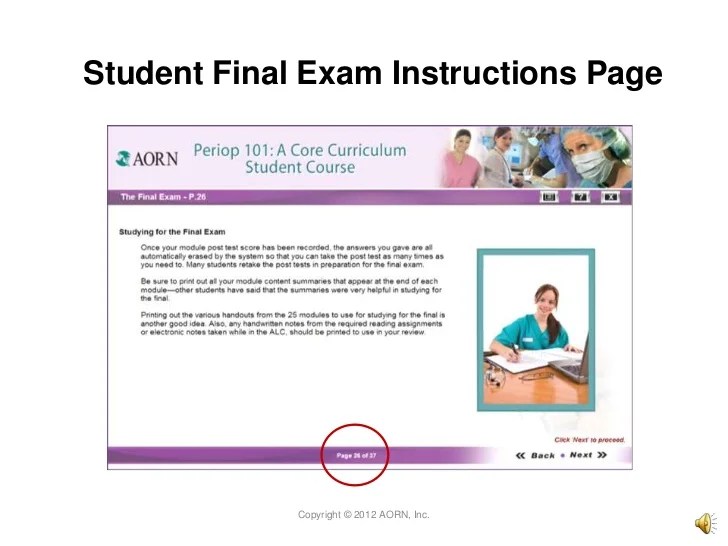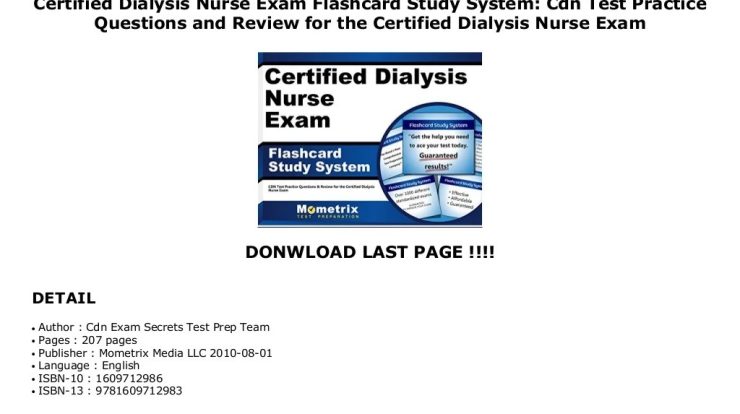Embark on the journey of mastering the AORN Periop 101 Final Exam. This comprehensive guide unlocks the secrets of this crucial assessment, empowering you with the knowledge and strategies to excel.
Delve into the exam structure, content areas, study materials, test-taking techniques, and practice questions that will guide your preparation.
Introduction
The AORN Periop 101 Final Exam is a comprehensive assessment that evaluates the knowledge and skills of perioperative nurses. The exam is designed to ensure that nurses have a solid understanding of the principles and practices of perioperative nursing, including patient care, safety, and quality improvement.
Passing the exam is a requirement for certification as a Certified Perioperative Nurse (CNOR).
Purpose and Importance
The AORN Periop 101 Final Exam is an important milestone in the career of a perioperative nurse. It demonstrates that the nurse has the knowledge and skills necessary to provide safe and effective patient care in the perioperative setting. The exam also helps nurses to identify areas where they need additional education or training.
Exam Structure

The AORN Periop 101 final exam consists of a comprehensive assessment of your knowledge and understanding of perioperative nursing concepts.
If you’re looking to master the AORN Periop 101 Final Exam, it’s essential to have a solid understanding of geometry. Whether you need to calculate the volume of a surgical instrument or measure the angle of a wound, geometry is a crucial skill in the operating room.
To refresh your memory on the basics, check out Unit 1 Basics of Geometry and get ready to ace that final exam!
Exam Format
The exam comprises:
- 100 multiple-choice questions
- 100-minute time limit
Content Areas
The exam covers a wide range of perioperative nursing topics, including:
- Patient care and safety
- Surgical procedures
- Sterile technique
- Equipment and instrumentation
li>Communication and teamwork
Study Materials
To excel in the AORN Periop 101 final exam, it’s crucial to utilize the most effective study materials. These resources provide comprehensive coverage of the exam’s content, allowing you to approach the test with confidence.The recommended study materials include:
- AORN Periop 101 Textbook:This textbook is the primary resource for the exam, covering all the essential concepts and topics.
- AORN Periop 101 Study Guide:The study guide provides additional practice questions, case studies, and summaries to reinforce your understanding of the material.
- Online Study Resources:Various online platforms offer practice tests, flashcards, and interactive quizzes to enhance your exam preparation.
- Past Exam Papers:If available, reviewing past exam papers can give you valuable insights into the exam format and the types of questions you can expect.
To effectively use these materials, it’s recommended to:
- Start Early:Begin studying well in advance to allow ample time for content review and practice.
- Create a Study Plan:Structure your study sessions, allocating specific time slots for each subject or topic.
- Review Regularly:Consistent review is key to retaining information. Go over the material multiple times to solidify your understanding.
- Practice with Questions:Engage in practice questions and mock exams to test your knowledge and identify areas for improvement.
- Seek Clarification:If you encounter any challenging concepts, don’t hesitate to reach out to your instructors or study group for clarification.
By diligently utilizing these study materials and following the recommended strategies, you can significantly increase your chances of success in the AORN Periop 101 final exam.
Test-Taking Strategies
Approaching the AORN Periop 101 final exam effectively requires a combination of preparation and strategic thinking. Here are some tips and techniques to help you maximize your performance:
Time Management
The exam is timed, so it’s crucial to allocate your time wisely. Prioritize questions based on their point value and the time required to answer them. Start with the questions you’re most confident in to build momentum and reduce stress.
Question Types
The exam includes various types of questions, including multiple-choice, true/false, and short answer. For multiple-choice questions, eliminate incorrect answers first and make an educated guess if unsure. For true/false questions, read carefully to avoid being tricked by double negatives or ambiguous wording.
Short answer questions require concise and accurate responses that demonstrate your understanding of the concepts.
Active Recall
Instead of passively rereading notes, engage in active recall by testing yourself on the material. This helps strengthen your memory and improve your ability to retrieve information under pressure.
Mind Mapping
Create mind maps to organize and visualize key concepts. This can help you connect different topics and identify areas where you need further review.
Take Breaks
If you find yourself feeling overwhelmed, take short breaks to clear your head and refocus. Stepping away from the exam for a few minutes can improve your concentration and prevent burnout.
Practice Questions
Engaging in practice questions is crucial for assessing your comprehension and identifying areas that require further attention. Here are a few sample questions to assist you in your preparation:
By solving these practice questions, you can enhance your understanding of the concepts covered in the exam and boost your confidence in answering similar questions on the actual test.
Question 1
- Explain the significance of maintaining a sterile field during surgical procedures.
Question 2
- Describe the proper technique for donning and removing sterile gloves.
Question 3
- Discuss the importance of effective communication in the perioperative setting.
Question 4
- Explain the role of the perioperative nurse in patient safety.
Exam Preparation Timeline: Aorn Periop 101 Final Exam
Adequate preparation is crucial for success in the AORN Periop 101 final exam. Creating a detailed timeline and adhering to it will help you stay organized and on track. Here’s a recommended timeline:
Month Before the Exam
- Review course materials and identify areas needing improvement.
- Start practicing practice questions to gauge your understanding.
- Set aside dedicated study time each day.
Two Weeks Before the Exam, Aorn periop 101 final exam
- Increase study hours and focus on weak areas.
- Take practice exams under timed conditions.
- Review and correct practice exam answers.
Week Before the Exam
- Reduce study time and focus on reviewing key concepts.
- Get plenty of rest and stay hydrated.
- Avoid cramming at the last minute.
Day Before the Exam
- Relax and go over notes briefly.
- Get a good night’s sleep.
- Arrive at the exam location on time.
Remember, consistency and pacing are key. Regular study sessions will help you retain information better than cramming at the end. Stay positive and confident, and you’ll be well-prepared for success.
Additional Resources

Beyond the materials provided by the AORN, candidates can access additional resources to enhance their exam preparation.
These resources offer diverse perspectives, support systems, and practical guidance to complement individual study efforts.
Online Forums and Study Groups
Online forums and study groups connect candidates with peers, mentors, and experienced professionals in the perioperative field.
These platforms facilitate discussions, question-and-answer sessions, and the sharing of study tips and strategies.
Engaging in these communities fosters a sense of camaraderie, reduces isolation, and provides valuable insights from individuals who have successfully navigated the exam.
FAQ Corner
What is the purpose of the AORN Periop 101 Final Exam?
The exam assesses your knowledge and skills in perioperative nursing, ensuring your readiness for the challenges of the operating room.
What resources are available to help me prepare for the exam?
The AORN website, study guides, and practice questions provide valuable materials to enhance your understanding and confidence.
How can I effectively manage my time during the exam?
Prioritize questions based on your strengths, allocate time wisely, and don’t dwell on difficult questions. Move on and return to them later if time permits.
